|
Books Should Be Free Loyal Books Free Public Domain Audiobooks & eBook Downloads |
|
|
Books Should Be Free Loyal Books Free Public Domain Audiobooks & eBook Downloads |
|
Literature |
|---|
|
Book type:
Sort by:
View by:
|
By: Aldous Huxley (1894-1963) | |
|---|---|
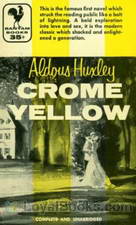 Crome Yellow
Crome Yellow
A shy, introverted young poet. A weekend in a magnificent English country house. A beautiful young lady whom the poet is secretly in love with. An assorted group of guests with varied interests, motives, ambitions and aspirations, and the complex web of history and events that connect all of them. Crome Yellow by Aldous Huxley was his first book, published in 1921, when he was just 27 years old. It is typical of many books written during this period by writers like Thomas Love Peacock and Somerset Maugham, centered round a country mansion and the quaint, British tradition of being invited to spend a weekend with a group of people whom one may or may not know... | |
 Defeat of Youth and Other Poems
Defeat of Youth and Other Poems
Though later known for his essays and novels, Aldous Huxley started his writing career as a poet. Published in 1918, The Defeat of Youth and Other Poems is his third compilation of poetry. The volume begins with "The Defeat of Youth", a sequence of twenty-two sonnets that explores irreconcilability of the ideal and the disappointing reality. Jerome Meckier called it “the century’s most successful sonnet sequence, better than Auden’s or Edna St. Vincent Millay’s.” In the rest of the volume, Huxley continues to explore themes started in The Burning Wheel, his first volume of poetry, including vision, blindness, and other contrasts... | |
 Antic Hay
Antic Hay
The epigram to this work from Christoher Marlowe applies to the plot of this story: "My men like satyrs grazing on the lawns / Shall with their goat-feet dance the antic hay." The plot follows Huxley and his cohorts in a search for meaning and hope and love in post WWI London. | |
 Limbo
Limbo
This is Aldous Huxley's first collection of short stories, which consists of 6 stories and a play. Characters in the play, "Happy Families", read by the following volunteers: Aston: ToddHW Aston's Dummy: James R. Hedrick Topsy: czandra Topsy's Dummy: czandra Sir Jasper: Marvin Larson Belle: Dawn Sutton Henrika: Rachel Costello Cain: Krista Zaleski Stage Direction: Krista Zaleski | |
 Mortal Coils
Mortal Coils
Aldous Huxley is best known as a philosopher and novelist – notably as the author of Brave New World. He also wrote poetry, short stories and critical essays. Most of his work is somewhat dark and mildly sardonic, partly because he came of age just after World War I, when all of Europe was in a state of cultural, political and social confusion. His novel, Crome Yellow, is a prime example. Mortal Coils includes four short stories and a play, including one of the author’s most famous short works: "The Gioconda Smile." - Summary by Kirsten Wever | |
By: Alec John Dawson (1872-1951) | |
|---|---|
 Finn The Wolfhound
Finn The Wolfhound
Dawson published over thirty books, the one best remembered today probably being the animal adventure story Finn the Wolfhound (1908)…. His own dog Tynagh and her son Gareth, who was described as the largest and finest specimen of his breed to date, served as the models for Tara and Finn in Finn the Wolfhound (1908). This is probably Dawson’s best-remembered and certainly his most frequently reprinted work: Finn, a champion Irish Wolfhound, is taken from England to Australia where he undergoes a series of adventures, being exhibited as a wild animal in a circus and escaping to live in the outback before eventually finding his old master and saving his life. | |
By: Alec Waugh (1898-1981) | |
|---|---|
 The Loom of Youth
The Loom of Youth
| |
By: Alex. St. Clair (Alexander St. Clair) Abrams | |
|---|---|
 The Trials of the Soldier's Wife A Tale of the Second American Revolution
The Trials of the Soldier's Wife A Tale of the Second American Revolution
| |
By: Alexander H. (Alexander Hay) Japp (1837-1905) | |
|---|---|
 Robert Louis Stevenson: a record, an estimate, and a memorial
Robert Louis Stevenson: a record, an estimate, and a memorial
| |
By: Alexander Hislop (1807-1865) | |
|---|---|
 The Proverbs of Scotland
The Proverbs of Scotland
| |
By: Alexander Hume | |
|---|---|
 Of the Orthographie and Congruitie of the Britan Tongue A Treates, noe shorter than necessarie, for the Schooles
Of the Orthographie and Congruitie of the Britan Tongue A Treates, noe shorter than necessarie, for the Schooles
| |
By: Alexander Lange Kielland (1849-1906) | |
|---|---|
 Tales of Two Countries
Tales of Two Countries
| |
 Skipper Worse
Skipper Worse
| |
By: Alexander Pope (1688-1744) | |
|---|---|
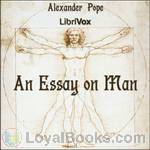 An Essay on Man
An Essay on Man
Pope’s Essay on Man, a masterpiece of concise summary in itself, can fairly be summed up as an optimistic enquiry into mankind’s place in the vast Chain of Being. Each of the poem’s four Epistles takes a different perspective, presenting Man in relation to the universe, as individual, in society and, finally, tracing his prospects for achieving the goal of happiness. In choosing stately rhyming couplets to explore his theme, Pope sometimes becomes obscure through compressing his language overmuch... | |
 An Essay on Criticism
An Essay on Criticism
An Essay on Criticism was the first major poem written by the English writer Alexander Pope (1688-1744). However, despite the title, the poem is not as much an original analysis as it is a compilation of Pope’s various literary opinions. A reading of the poem makes it clear that he is addressing not so much the ingenuous reader as the intending writer. It is written in a type of rhyming verse called heroic couplets. | |
By: Alexander Smith (1830-1867) | |
|---|---|
 Dreamthorp A Book of Essays Written in the Country
Dreamthorp A Book of Essays Written in the Country
| |
By: Alexander Whyte (1836-1921) | |
|---|---|
 Sir Thomas Browne and his 'Religio Medici' an Appreciation
Sir Thomas Browne and his 'Religio Medici' an Appreciation
| |
 Bunyan Characters Volume I
Bunyan Characters Volume I
This is the first volume of four which goes into the details of Characters from John Bunyan's books. This one is about characters of Pilgrims Progress. | |
 Bunyan Characters (3rd Series)
Bunyan Characters (3rd Series)
| |
 Bunyan Characters Volume II
Bunyan Characters Volume II
This is the second volume of four which goes into the details of Characters from John Bunyan's books. This one continues with the characters of Pilgrims Progress. | |
By: Alexandre Dumas (1802-1870) | |
|---|---|
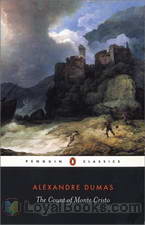 The Count of Monte Cristo
The Count of Monte Cristo
Written by French author Alexandre Dumas, The Count of Monte Cristo follows the life of Edmond Dantes as he embarks on a journey of revenge after being wrongly imprisoned and set up by none other than his so-called friends. Set during the years after the fall of Napoleon’s empire, the story unwinds in several locations including Paris, Marseilles, Rome, Monte Cristo and Constantinople. A handsome young sailor and soon to be ship captain Edmond Dantes seems to have it all in life, as he returns to Marseilles to wed the love of his life and fiancée, the beautiful Mercedes... | |
 The Three Musketeers
The Three Musketeers
The Three Musketeers follows the adventures of the young Gascon nobleman, D’Artagnan and his three trusted friends who served as musketeers in the king’s regiment – Athos, Porthos & Aramis. Written by Alexandre Dumas, the book was a bestseller during the time of its publication and it remains so even today. It follows the timeless theme of friendship and bravery. The main protagonist of the story is D’Artagnan who travels to Paris to realize his dreams of becoming one of the musketeers for the king... | |
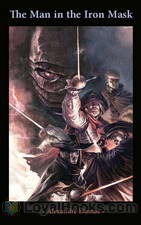 The Man in the Iron Mask
The Man in the Iron Mask
The Man in the Iron Mask by Alexandre Dumas is part of the novel The Vicomte of Bragelonne: Ten Years After, published in serial form between 1857-50. It is also the last of the D'Artagnan stories written by Dumas and the three musketeers are the real heroes of the story, though the title is given to the man in the iron mask. The story opens with Aramis (one of the musketeers who is now a priest) taking the last confession of a prisoner who is condemned to be executed soon. His confession comes as a thunderbolt to the former musketeer... | |
 Twenty Years After
Twenty Years After
First serialized from January to August, 1845, Twenty Years After is the second book in The D’Artagnan Romances, and follows the gallant adventures of the musketeers, as they are once again summoned to alleviate the various threats that lurk in the political scene of France, as the country is threatened by a possible uprising. Enriched with exciting and well-developed characters, the novel adds more detail to its familiar characters, as the musketeers have matured and are portrayed in a more introspective light... | |
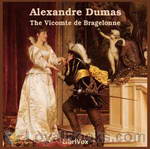 The Vicomte De Bragelonne
The Vicomte De Bragelonne
After The Three Muskateers and Twenty Years After the adventurous story of Athos, Porthos, Aramis and D'Artagnan continues!The Vicomte of Bragelonne: Ten Years Later (French: Le Vicomte de Bragelonne ou Dix ans plus tard) is the last of the Musketeer novels. It is usually divided into four volumes and this first volume contains chapters 1-75. | |
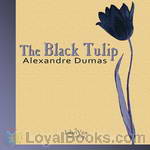 The Black Tulip
The Black Tulip
The Black Tulip, written by Alexandre Dumas père and published in 1850, is a historical novel placed in the time of Tulipmania in the Netherlands. The novel begins with the 1672 politically motivated mob lynching of the de Witt brothers and then follows the story of Cornelius van Baerle, godson of Cornelius de Wit. Cornelius Van Baerle has joined the race to breed a truly black tulip – and to win the prize of 100,000 guilders, as well as fame and honour. As he nears his goal he is jailed and then of course rescued – by the beautiful Rosa, daughter of the jailer. | |
 Louise de la Valliere
Louise de la Valliere
After The Three Muskateers and Twenty Years After the adventurous story of Athos, Porthos, Aramis and D'Artagnan continues! The Vicomte of Bragelonne: Ten Years Later (French: Le Vicomte de Bragelonne ou Dix ans plus tard) is the last of the Musketeer novels. It is usually divided into four volumes and this third volume contains chapters 141-208. | |
 Ten Years Later
Ten Years Later
After The Three Muskateers and Twenty Years After the adventurous story of Athos, Porthos, Aramis and D'Artagnan continues!The Vicomte of Bragelonne: Ten Years Later (French: Le Vicomte de Bragelonne ou Dix ans plus tard) is the last of the Musketeer novels. It is usually divided into four volumes and this second volume contains chapters 76-140. | |
 The Companions of Jehu
The Companions of Jehu
| |
 Marguerite de Valois
Marguerite de Valois
A historical fiction novel set in Paris (1572) during Charles IX's reign and the French Wars of Religion. Marguerite de Valois, daughter of deceased Henry II, is the novel's protagonist set against the infamous schemes of the Catholic power player, Catherine de Medici. | |
 Chicot the Jester
Chicot the Jester
This sequel to Dumas' “Marguerite de Valois” begins four years after the sudden death of King Charles IX and succession of his brother Henry III. The reign of King Henry III was plagued with rebellion and political intrigue due to the War of the Three Henries, where his regency was challenged by King Henry of Navarre (leader of the Huguenots) and Henry I, Duke of Guise (leader of the Catholic League). Dumas weaves two main storylines through this turbulent backdrop: one of the love ignited between le Comte de Bussy and la Dame de Monsoreau, and another of the friendship between King Henry III and his truly unique jester, Chicot (Jean-Antoine d'Anglerais). | |
 The Conspirators The Chevalier d'Harmental
The Conspirators The Chevalier d'Harmental
| |